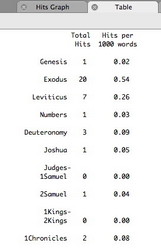Accordance makes it easy to find where words appear, but sometimes it’s more interesting to see where a word does not appear. Someone on our forums recently asked how to do just that:
While studying yesterday I discovered that the word “mercy” is not mentioned in the book of Revelation. This piqued my interest to see what other books that mercy is not mentioned in.
He got several answers, all of which revolved around doing a simple search for “mercy.”

A better way to see books that do not contain your search term is to click the Details button to open the Details Workspace. Then click the Table button to open the table of hits.
The Table has been around since Accordance 1.0 and gives you a book by book breakdown of the number of hits and word frequency. Just look for the zeros under Total Hits to find the books which do not contain your search term. The word “mercy” is conspicuously absent from Judges through 1 Samuel, both books of Kings, etc.
Another way to see where hits are generally absent is to look at the Hits graph. Here’s a Hits graph of the Greek word αγαπαω. (Please indulge the abrupt transition to a completely different search!)
As you can see, the book of Acts is conspicuously void of hits. A quick check of the table confirms that there are no occurrences of αγαπαω in the book of Acts. Neither is “love” used in the books of Philippians, 1 Timothy, Titus, or Philemon!
The absence of words can raise interesting questions. For example, why is αγαπαω never used in the book devoted to chronicling the growth of the early church? If the concepts of divine love and brotherly love were so important to the primitive church, why no mention of them in Acts? It also seems odd that “love” is not used in some of Paul’s most personal letters. For example, why would Paul not use the concept of love to urge Philemon to show kindness to his runaway slave?
To answer those kinds of questions, it’s important to make sure you’ve included all the words related to a given concept. For example, αγαπαω is the verb “to love,” but it might be absent from a book which includes the noun αγαπη or the adjective αγαπητος. One easy way to search for a group of related words like this is to search by their root form. I’ll talk about how to do that in my next post.


